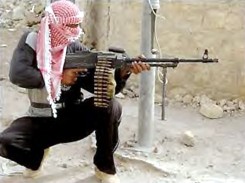Analysis: Rising violence swells ranks of Iraq's militias
 BAGHDAD — Retaliatory attacks sparked by last week's massive bomb assault on a Shiite neighborhood here are driving more Iraqis into the ranks of sectarian militias amid rising distrust of government security forces, newly recruited gunmen and residents said Monday.
BAGHDAD — Retaliatory attacks sparked by last week's massive bomb assault on a Shiite neighborhood here are driving more Iraqis into the ranks of sectarian militias amid rising distrust of government security forces, newly recruited gunmen and residents said Monday.Besieged Iraqis, many with no previous affiliation with established militias, are taking up arms, barricading their communities and joining new Shiite Muslim militia cells or increasingly militant Sunni Arab neighborhood-watch groups.
"We have zero trust in the Iraqi army and minus-zero trust in the police," said Ahmed Suheil Juburi, 33, a Sunni Arab who has thrown in his lot with a group of former military officers in Saddam Hussein's Baathist regime patrolling the Baghdad neighborhood of Dora.
Thousands of unsanctioned fighters have been on high alert since the car bombings Thursday in Sadr City, a poor Baghdad neighborhood that is home to the Al Mahdi militia, a Shiite force loyal to anti-U.S. cleric Muqtada Sadr.
Since the attack, which killed at least 215 people, Sadr's fighters have struck back at Sunni neighborhoods with mortar shells, rockets and machine-gun raids from fast-moving SUVs. Sunni Arab fighters have retaliated in kind.
The bombings and subsequent attacks have killed 524 people, including 181 whose bodies were left in Baghdad's streets, and injured 653 since Thursday, according to government tallies obtained by The Times.
The mounting carnage is another sign that Iraq's civil war is gaining momentum faster than either the U.S. or Iraqi governments can respond.
In Baghdad, mortar shells have continued to pummel neighborhoods, and bands of men drive people out of their homes at gunpoint. Authorities find corpses in trash heaps and side streets on a daily basis; at least 44 were found Monday.
Residents are blocking roads with blasted cars and tree trunks. Guns and ammunition are being passed out in mosques and homes. Throughout Baghdad, men end their workdays by taking up positions on rooftops and minarets.
Fighters on both sides of Iraq's sectarian conflict say that the recent growth of militias stems from deep distrust of the intent and capability of the nation's security forces, whose reputation has been crippled by corruption and sectarian infiltration.
Read the rest at the LA Times

<< Home